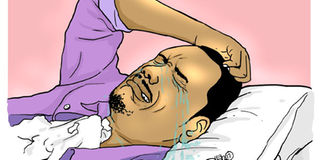Tearing up doesn’t compromise a man’s masculinity

You are not alone if you find it awkward for a man to cry, especially in public. The truth, according to experts is that men too should cry to ease pain and tension.
PHOTOI FILE.
What you need to know:
- I could tell he was going through a rough time following a facebook post a few minutes earlier.
- Daniel is married with three children. Most of his facebook posts are always about God. On that particular day, he had written words that made me think all was not well with him. His post read, ‘Can a man cry? What does it really mean? How should it sound? #Pain.’
A friend of mine, Daniel Isihaka, did not pick his cell phone when I called him over a week ago. Instead, he texted asking if I could drop him a text message.
I could tell he was going through a rough time following a facebook post a few minutes earlier.
Daniel is married with three children. Most of his facebook posts are always about God. On that particular day, he had written words that made me think all was not well with him. His post read, ‘Can a man cry? What does it really mean? How should it sound? #Pain.’
His post reminded me how it is rare to see a man cry. A male colleague in the office told me as I wrote this story that he could not recall the last time he cried. He did not cry when his father died, he said.
“A man should not cry. It is a sign of weakness. I cannot allow my son to cry,” my male colleague said.
Back to my friend Daniel.
Daniel called two days later to explain why he did not pick my call that day. He had been in a bad mood. He had just lost his job and had been in a long time misunderstanding with his siblings.
The house in which he is currently living is among assets left by their parents, both who died in a car accident seven years ago.
“There is a lot going on from my side. None of my relatives understands what I am going through. And the fact that I have lost my job, I am confused on how I am going to feed my family as well as getting a house to rent,” he told me.
On the day he posted about crying on facebook, one of his brothers had gone to their family house (where Daniel lives) and started a physical fight with his wife. He did not know that Daniel was inside. Daniel had locked himself in the bedroom because that was the day he lost his job.
“My family has no problem with moving from the family house. It’s only that I don’t have enough money for rent at the moment. I had asked my siblings to give me until January next year but they declined,” Daniel said.
On why he had asked if it was right for a man to cry in that facebook post, Daniel says his parents, grandparents, teachers and neighbours used to stop boys from crying, saying crying was a sign of weakness.
“I grew up knowing that crying was only for girls and women. I was told to be brave under any circumstances. It has always remained in my mind that crying is only for girls,” says Daniel.
Daniel had decided to stay in his bedroom as his brother fought with his wife to avoid embarassment in front of his wife. He thanks God their children were at school at the time.
Although Daniel knows that failure to cry when you are in distress can result to health problems, still he never cries, he did not cry that day when he lost his job and had problems with his siblings and neither does he plan to cry anytime soon. He wishes he could cry but he just can’t. HE IS A MAN!
Experts have it that crying is a healthy way to release emotions and cleanse the soul. But most men are hesitant to let the tears flow during an emotional time, either because they don’t know the benefits of letting out or just because of pride.
Godfrey Temu, 30, an employee at Majani ya Chai Secondary School in Yombo, Dar es Salaam agrees that men grow up hearing that men are not supposed to cry or be fearful. However, he believes deep inside that men should cry.
“Both men and women are all human beings who can’t easily handle pain without crying. I grew up believing it was not okay for a man to cry until I met a Japanese preacher at a church gathering two years ago,” says Temu.
The preacher talked about the power of forgiveness. He talked about the process to forgive and said crying was part of it. He insisted that men too should cry to ease pain and tension.
Temu says the preacher reminded him of his bitter childhood with his step mother. During the prayer session that day, he just found himself crying, though he quickly stopped himself from doing so lest anyone saw him.
“I had that feeling that a man should never cry. I composed myself and later cried rivers once I got home. I cried for long hours. I allowed myself to cry every time bitter memories flooded my mind,” says Temu.
He says it was a month of crying and long sleepless nights. He prayed while crying as the preacher had advised until he felt he was no longer in pain with his childhood memories.
Urio Mbago, a psychologist at Mororogoro Regional Hospital says there are three types of tears namely, psychic, basal and reflex.
Basal and reflex tears are involutanry tears that protect our bodies against dryness, whereas psychic tears are emotional tears brought about by anger, anxiety and sadness among others. This type of tears have a natural pain killer called leucine encephalin. They help people manage emotional overload.
Urio says that crying is very useful to every human being regardless of their gender. It helps manage stress and anxiety. Most men, Urio says, are forced by society to wear brave faces when they are emotional.
“In ten men that I receive a month for counselling, only two or one cries. After the session they always apologise for crying believing it is wrong,” says Urio.
He says crying is the easiest way for stress reduction and that it helps people from being abusive. A majority of men can’t cry and as a result they turn their emotions into abusive behaviours.
Irene Sanga, 45, a nurse at Arafa dispensary in Segerea says there is a lot of relief in a crying person compared to the one who neither cries nor shares their problems.
She believes women live longer than men because they cry a lot and they are always free to share their problems with their friends unlike men.
Urio the psychologist concedes saying that not crying for too long creates poison that can result to health challenges like depression, blood pressure and others. If not well taken care of in advance, this can result to death, Urio warns.
“I cry a lot. I also have a solid network of friends and relatives with whom I can trust and easily share my problems. I just feel okay after crying and talking to a friend,” says Irene.
Irene thinks a man should cry but in private as it is unusual for a man to cry in public. In her life, she has never seen a man cry. If it happens that she sees a man crying in public, she will be curious to know the reason and would advise the man to cry in private to avoid embarrassing himself.
Rose Ruvugo, a mother of four children remembers only one incident in her life when she saw a man cry in public. That was 17 years ago when her father burst into tears as he paid his last respects to Rose’s late sister, the first born in their family.
“My father’s image crying openly is still clear in my mind like it just happened yesterday. He just could not resist crying. I remember how he removed his coat and put it inside my sister’s coffin. She was burried with the coat,” says Rose.
“I never thought a man could cry in public. I was also crying in pain but seeing my father in that situation eased my pain knowing that I was not alone in grief,” adds Rose.
Aisha Ramadhan, 30, a business woman at Kariakoo market says she only saw her husband cry once during their wedding. He did so as he narrated how their mother had struggled all alone to raise them following their father’s demise almost 30 years earlier.
Aisha was baffled because she never though that a man could ever cry in public. She wanted to hug him but she was so paralysed at the sight that she couldn’t make a move. Her husband later finished his speech and took his seat still in tears.
She has since never discussed the incident with her husband and she has no plans to ever bring about the topic.
Faustine Kazinduki, 63, a resident of Kimara and a father of five believes the intention to discourage boys from ever showing their emotions meant well. That men as heads of households should create a safe environment for the family by never crying in any situation. Not crying is a sign of bravery. It shows that one is strong and this is what is expected of a family head.
“I can’t exactly tell why, how and when it started but I just grew up in an era where it was strictly forbidden for a man to cry. I taught my sons the same. I also tell my grandchildren the same,” he says.
Novelty Deogratias, a psychologist based in Dar es Salaam says holding so much pain for a long time creates poison and that research shows that crying helps to remove the poison from our bodies.
Parents, kindly let your sons be. Let them cry!
Email: [email protected]




